This language is currently in review and will be available soon!

5 December 2023
The current policy brief highlights the significant potential that religious teachings and religious teachers and clerics can have in combating intimate partner violence (IPV) and how this could be leveraged by means of a case study and select published literature. It draws from findings from long-term anthropological research with communities in Ethiopia and evidence collected from a recent programme implemented by project dldl/ድልድል that engaged Christian clergy to build their preparedness to respond to domestic violence in Ethiopia. The findings from the case study suggest that theology-informed IPV trainings could enable religious teachers to become more active in IPV responses, provided that a) theological responses are embedded in the religious tradition that faith communities consider authoritative, and b) trainers are fully versed in the cultural context, theological tradition and IPV realities that the religious teachers they train are faced with in their everyday life.
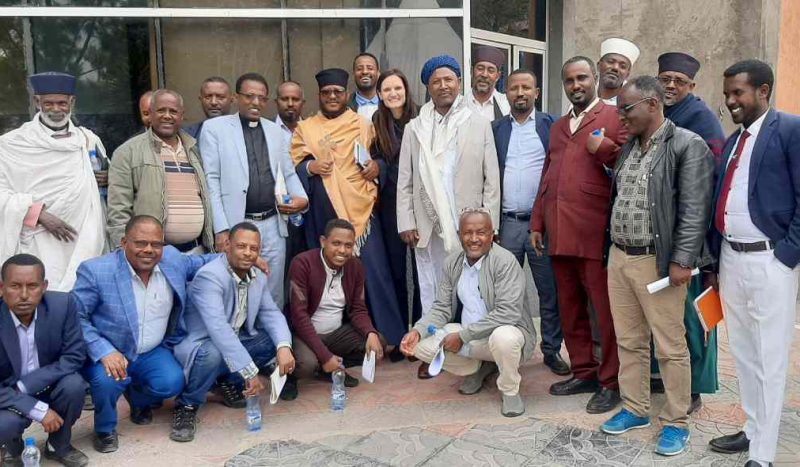
17 June 2022
Project dldl/ድልድል with the support of partner organisation EOTC DICAC in Ethiopia convened on Friday an all-Amharic inter-faith meeting on domestic violence in Debre Birhan, Amhara region with clergy, pastors and religious teachers from Ethiopia’s diverse religious groups. Participants included a Muslim Sufi Sheikh, priests from the Ethiopian Orthodox Church, and pastors from the Kalehiwot Church, the Mekane Yesus Church and other religious institutions. Officials representing the North Shoa government bodies that supported the project were also present. Dr Romina Istratii and EOTC DICAC colleague, Kesis Aklil Damtew presented a recently completed pilot programme with Ethiopian Orthodox priests on domestic violence and invited the participants to reflect on how the pilot could be made relevant and be extended to other religious communities in Ethiopia. After the meeting, the team was invited to the EOTC Church office to meet Abuna Klementinos (Clement) and then to the North Shoa Media Office to discuss the use of social media, modern technologies and creative industries in communicating with the faithful, raising awareness and responding to social and domestic issues and problems in the community.
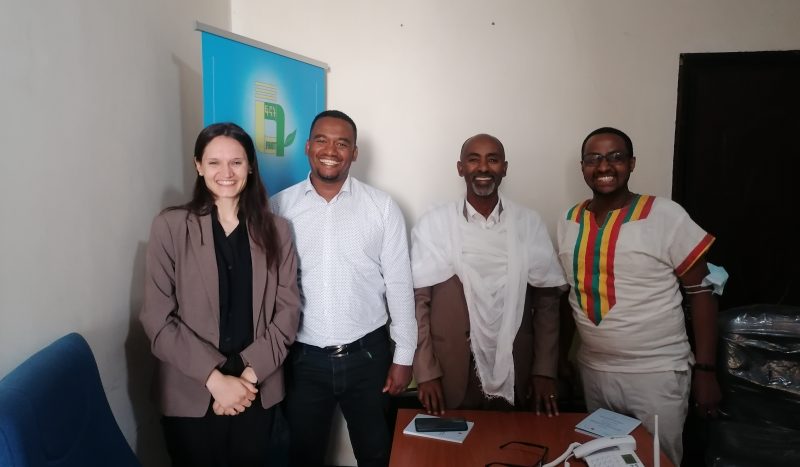
2 March 2022
On Adwa Day in Ethiopia, the Project dldl/ድልድል team visited the offices of Fnot (ፍኖት), a newly founded organisation that works to provide faith-informed psychological support to Ethiopians affected by domestic violence, mental health and other psychological issues. The organisation is led by the humble vision and hard work of Kesis Yigzaw, who is both a priest and a trained psychologist, and a team of highly motivated Board members combining psychological, theological, legal and other skills and professional training. Project dldl/ድልድል met with the Fnot leadership to explore how the two initiatives can work together to co-design and implement a faith-informed counselling programme to support domestic violence victims and perpetrators in Ethiopia. Dr Romina Istratii discussed the project’s vision to develop a faith-informed treatment programme for perpetrators leveraging on psychological techniques and theology. The meeting concluded with both parties’ commitment to future collaboration motivated by a vision to make faith-informed psychological counselling more widely accessible to the Ethiopian public.
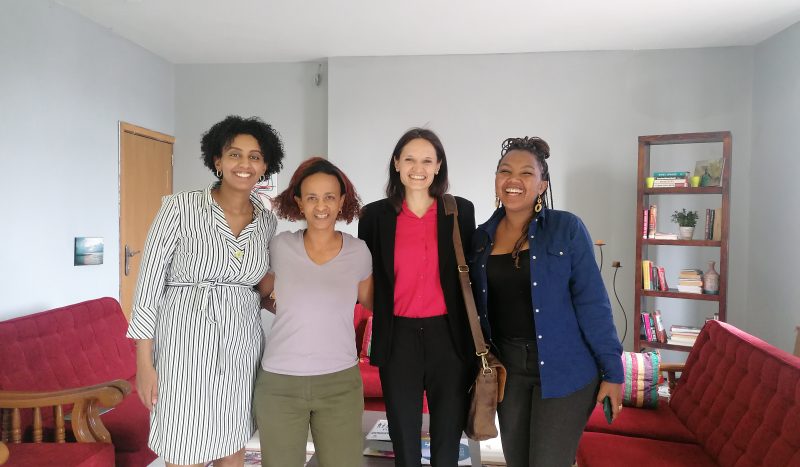
28 February 2022
Today, Dr Romina Istratii and Ms Etsegenet Hailemekael of project dldl/ድልድል visited the offices of Setaweet in Addis Ababa, Ethiopia. The team met with Founder Dr Sehin Teferra and colleagues at Setaweet to share knowledge and experience and to explore synergies. The meeting revolved around the importance of engaging both secular and faith-based organisations and stakeholders in the response to domestic violence, the role of faith and the clergy in the Ethiopian rural (and urban) context specifically, and pathways to productive cross-sectoral integration and collaboration. Inter alia, project dldl/ድልድል and Setaweet discussed the possibility of holding a roundtable at a future conference planned by project dldl/ድልድል that will aim to bring together secular and religious stakeholders in an effort to take a more substantive step into establishing mutual understanding, dialogue and collaboration in the advocacy and promotion of women’s and gender issues.
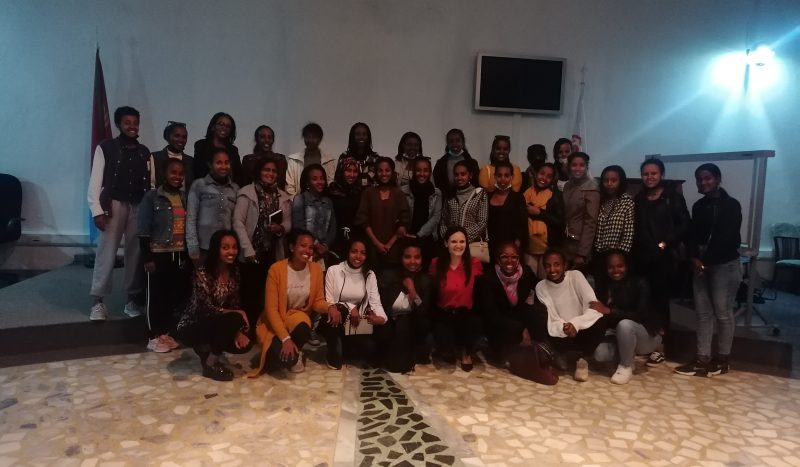
11 February 2022
During her recent stay in Asmara, Dr Romina Istratii was invited to deliver a talk on research ethics and data management applying a decolonial perspective fitting to the context of Eritrea. The talk took place at the offices of the National Union of Eritrean Women and was attended by over 30 female members working in different civil service and government sectors. The talk, lasting over two hours, covered themes such as obtaining informed consent, respecting confidentiality and/or anonymity, data management and accountability, as well as research reflexivity regarding positionality in research and one’s relationship to communities. Dr Romina Istratii explored the principle of ‘objectivity’ in research and discussed how the subjectivity-grounded nature of all research could be navigated to conduct valuable research. The presentation concluded with a group photo to commemorate the beginning of what is hoped to be a long-term relationship between Dr Istratii and SOAS with the National Union of Eritrean Women.
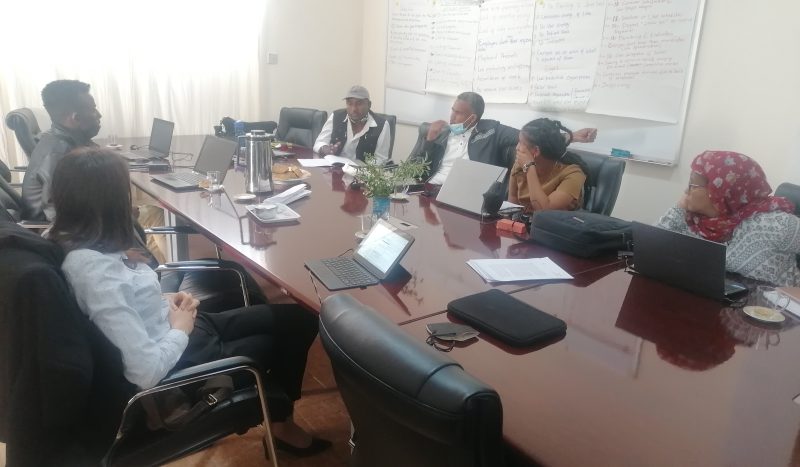
6 February 2022
On 6 February, Dr Romina Istratii arrived in Asmara, Eritrea to formally launch project dldl/ድልድል in the country and to meet with the coordinating organisation, Waniney, and to support the development of project activities in the country. Since her arrival, Dr Istratii has worked side-by-side with the local team of Eritrean researchers (recruited into the project in earlier months) to complete a literature review on domestic violence and religious parameters and to finalise the research methodology and approach for country-wide fieldwork to be undertaken in the next following weeks by an Eritrean research team. Dr Istratii and the Founder of Waniney, Ms Mebrak Ghebreweldi, also met with the Board of Advisors to the project, who combine key stakeholders including the National Union of Eritrean Women, the College of Business and Social Sciences at Adi Keih, the Youth Association, the Office of Religious Affairs, as well as public health specialists, clergy and nationally recognised cultural advisers.

9 November 2021
Today the project dldl/ድልድል team visited the offices of the Norwegian Church Aid organisation in Addis Ababa. Dr Romina Istratii was invited by Programme Advisor on GBV Mr Mengistie Tegenie to create connections and explore synergies and possible integration across their respective projects on GBV and domestic violence working with faith actors and theology. Mr Tegenie presented the NCA’s working model in Ethiopia, lessons learned and specific activities in addressing GBV and other gender-related issues. The team was later joined by NCA Director in Ethiopia Mr Eivind Aalborg, who shared with Dr Istratii the organisation’s beginnings and progression in Ethiopia since 1974 and discussed the importance of integrating more research-based approaches and rigorous assessment for achieving a dynamic learning within and across social impact projects. Both sides agreed to meet again to discuss a possible long-term partnership and areas of collaboration, such as in capacity building for conducting rigorous research and integrating each others’ activities to achieve scaling out effects.

4-7 October 2021
In the past week, the project dldl/ድልድል team delivered two more workshops with Ethiopian Orthodox Täwahәdo Church clergy, completing training of over 150 EOTC clergy in year 2021. The workshops are organised in collaboration with the Ethiopian Orthodox Church Development and Inter-Church Aid Commission (EOC-DICAC) in Ethiopia working through the Church structure and with the support of local diocese offices. The workshops were designed by Dr Romina Istratii on the basis of previously completed long-term anthropological research with EOTC clergy in northern Ethiopia, and seek to improve the clergy’s preparedness to respond to victims and perpetrators sensitively. The workshops include ethnographic findings on domestic violence and faith, theological material to clarify Church teachings on marriage-related issues and domestic violence drawn from the homilies of St John Chrysostom, safeguarding training focusing on the need for confidentiality and non-judgemental approaches to avoid re-traumatisation/retaliation, and legal and referral information about domestic violence. The workshops are delivered in Amharic and include reflection exercises, group activities and scenario and case studies and are facilitated by Dr Romina Istratii and co-delivered with the support of two trainers, deacon and psychology counsellor Mr Henok Hailu and attorney and consultant in law Ms Beza Birhanu.
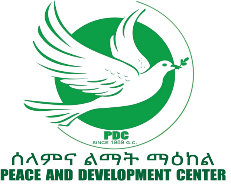
1 September 2021
Project dldl/ድልድል met with colleagues at the Peace and Development Centre in Addis Ababa to share lessons and explore collaboration in a trauma-centred initiative that seeks to respond to war violence, including SGBV, in Tigray region. Dr Romina Istratii shared findings from an extensive literature review that explored psychosocial responses in conflict and emergency contexts, drawing attention to complex trauma and the anticipated increase in domestic violence and other forms of violence during and post-conflict. She emphasised the need for responses that combine society-wide support with psychological clinical counselling as per individual need. Project dldl/ድልድል and PDC colleagues also discussed the centrality of the clergy and religious beliefs in the life of the local communities and identified ways of effectively engaging the clergy in awareness-raising and collective trauma healing processes. The meeting concluded on the note that project dldl/ድልድል and PDC should continue to share knowledge and work to identify ways of collaborating in an integrated manner in the future.
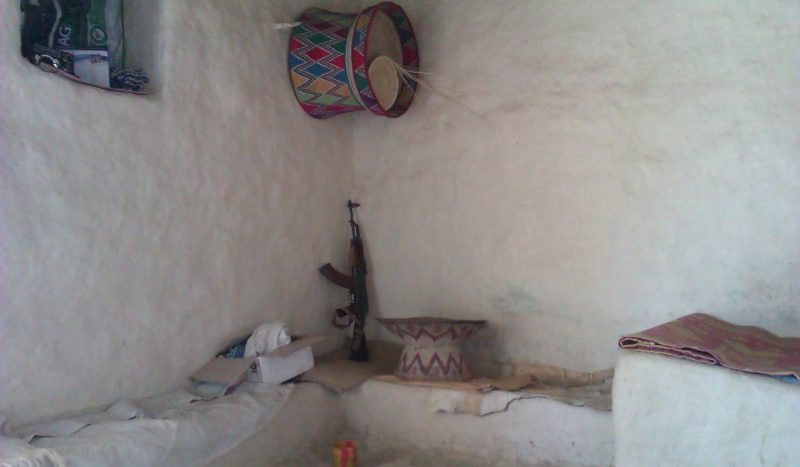
23 July 2021
On Friday, Dr Romina Istratii met with colleagues from the British Embassy in Ethiopia and the UK’s FCDO department in order to discuss the current humanitarian crisis in Tigray and appropriate responses to extensive SGBV in the region. Dr Istratii was approached due to her specialised research in the region and as a result of the more recent work conducted within the context of project dldl/ድልድል that explored the relationship between war violence, mental health trauma and domestic violence. Dr Istratii discussed thoroughly the need for evidence-based religio-culturally sensitive approaches that leverage on productive collaborations with local researchers in Tigray and Ethiopia and more reflexive community engagement approaches that do not perpetuate colonial dynamics as seen often in the humanitarian sector.
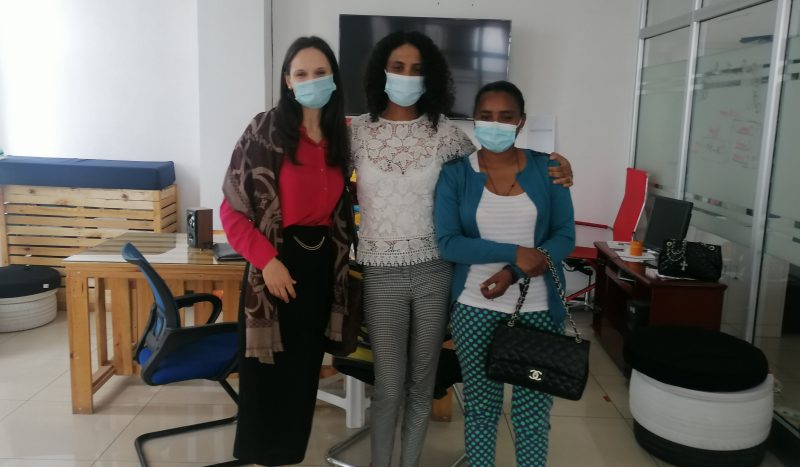
24 May 2021
Project dldl/ድልድል visited the Erk Mead mental health trauma healing centre to share experiences and to explore collaboration and opportunities for integrating their respective work. Dr Romina Istratii and Ms Tigist Waltenigus, the CEO of Erk Mead, discussed at length the lessons learned from the organisation’s work on mental health trauma, the need to provide culture-sensitive support that considers how communities and individuals in Ethiopia have traditionally thought about mental health and to integrate faith as this is an important parameter in everyday life for most Ethiopians. Dr Istratii shared her research conducted previously in Tigray that had explored the role of faith and the clergy in marriage and situations of domestic violence and spoke about the need for faith-based treatment approaches for perpetrators and psychosocial support for victims/survivors. The two also discussed the mental health of the clergy and the need to support religious personnel psychologically to address their own traumas and to be able to respond more effectively to the traumatic experiences of the individuals they support spiritually.
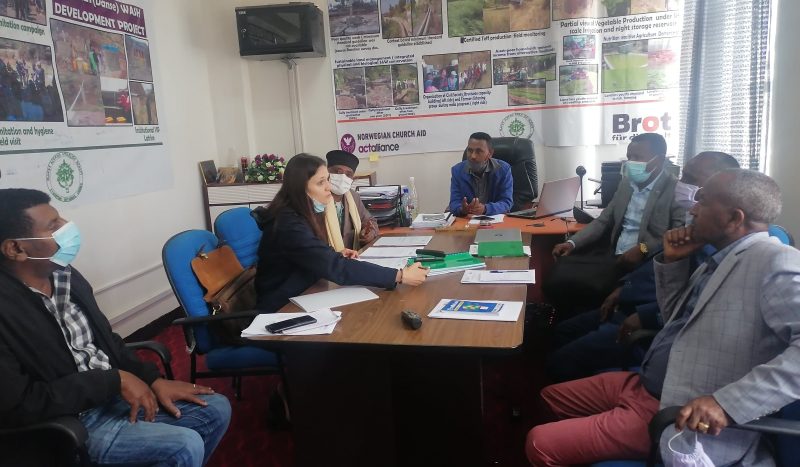
18-19 May 2021
The team of project dldl/ድልድል successfully launched a series of 10 workshops to build the preparedness of Ethiopian Orthodox Täwahәdo clergy in Debre Birhan to respond to domestic violence in their communities. The first workshop, which lasted two half-days, was comprised of discussion, group activities and presentations led by the delivery team, comprised of Dr Romina Istratii, deacon and psychology counsellor Henok Hailu and project assistant Ms Liya Desta. The team was also accompanied by Mr Aklil Damtew, the project coordinator at the partner organisation, EOC DICAC. Participants included 22 members of EOTC clergy from the area of Debre Birhan and the surrounding countryside, of different rankings. At the end of the workshop, participants were handed free booklets containing summaries of the workshop content, including experiences and understandings of domestic violence from the countryside of Ethiopia, theological teachings on marriage, spousal cohabitation and domestic violence and safeguarding protocols when advising victims and perpetrators of violence to minimise risks. Workshops were recorded to be assessed for research purposes, and assessment questionnaires were filled in by participants to review the quality and usefulness of the workshops.
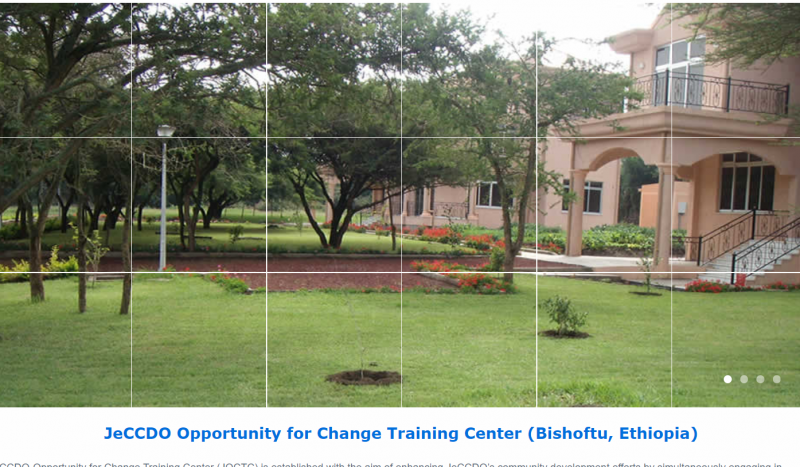
12 May 2021
Dr Romina Istratii travelled to Debre Birhan, North Shoa Zone to meet the EOC DICAC focal staff and local diocese officials in preparation for launching a series of workshops with Ethiopian Orthodox Täwahәdo clergy from the surrounding countryside next week. The workshops will seek to create reflective spaces to raise the clergy’s awareness of the complexities of domestic violence in rural Ethiopian societies, provide clergy with theological training to teach on marriage and against domestic violence and to help them become more aware of available victim support systems in an effort to develop a more integrated referral system in the country. In the meeting, Dr Istratii presented in Amharic the research previously completed in Northern Ethiopia and discussed how its insights apply to Debre Birhan to inform interventions with clergy, as well as dictate needs for new research in the surrounding countryside. The stakeholders present then provided their responses and impressions, unanimously approving of the approach of the project and speaking of its potential to address clergy-related and societal challenges in a substantive and sustainable manner.
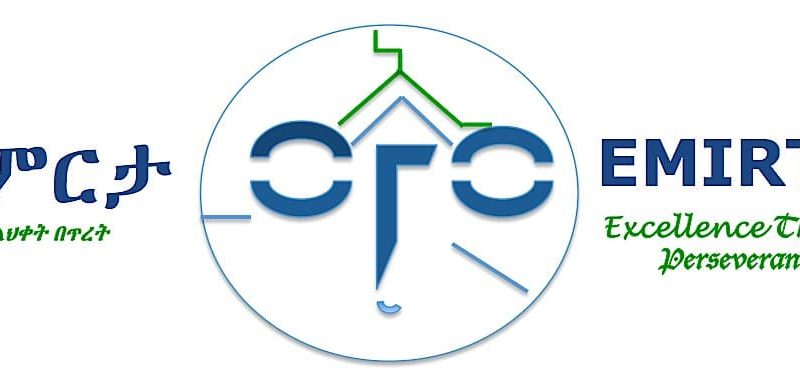
20 March 2021
Dr Romina Istratii met with EMIRTA director, Mr Zinawork Assefa, and a group of colleagues comprising the new EMIRTA Research, Training and Development Institute to explore collaboration and further knowledge exchange between the two initiatives and how project dldl/ድልድል could help to promote the institute’s strategic goals. EMIRTA colleagues praised the approach of project dldl/ድልድል to emphasise ethnographic and participatory approaches to research on religious and gender issues, condoning the need for raising more awareness in the country around cognitive and scientific colonisation and stressing the need for substantive engagement with indigenous knowledge and wisdom, including in addressing the issue of domestic violence in Ethiopia’s religious societies
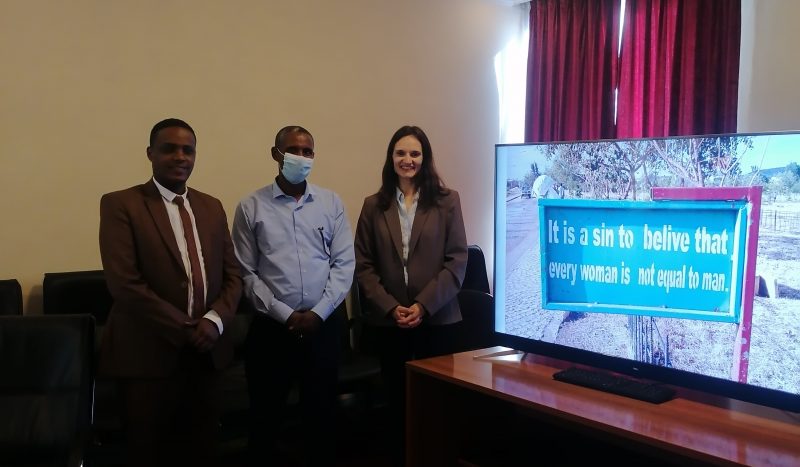
8 December 2020
Dr Romina Istratii presented the results of her research completed with clergy and laity in Aksum to explore domestic violence attitudes and realities to the director of EOC DICAC, Mr Yilikal Shiferaw, the head of the Department of Health, Mr Bantamlak Gelaw, and project staff, Mr Aklil Damtew, at their offices in Arat Kilo, Addis Ababa in Ethiopia. Following the presentation, which the audience found highly accurate and insightful of Ethiopian rural realities, EOC DICAC agreed to enter in collaboration with project dldl/ድልድል to disseminate the evidence and put it to practice, such as by facilitating the delivery of a series of workshops with clergy in Ethiopia.